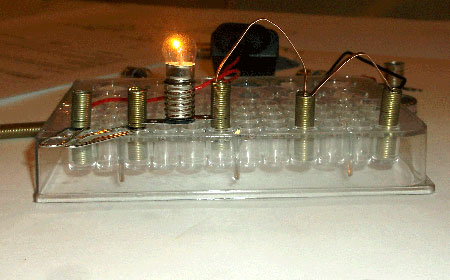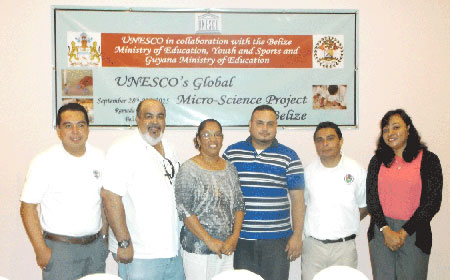BELIZE CITY, Tues. Sept. 29, 2015–A two-day workshop on micro-science was held for teachers from high schools in Belize. This was the final workshop in a series of workshops held in Guyana, St. Lucia and Belize, said Dr. Rudolph Anthony, Secretary General, UNESCO, Belize. Guyana was introduced to this new way of learning three years ago and since then it has made a vast difference in the CXC results of their students, said Anthony.
A sub-regional project amongst Belize, St. Lucia and Guyana was approved by UNESCO, which allotted US$35,000.00 for workshops to be held in all three countries to train science teachers at the high school level, particularly high schools without resources or only a limited amount of laboratory resources. Representatives from Belize and St. Lucia travelled to Guyana to participate in a workshop there, prior to having these workshops in their own countries, Anthony explained.

In explaining the project, Petal Jetoo, the Project Coordinator of UNESCO Global Microscience Experiments stated that bigger is not necessarily better. “The micro-science program is simply the design of experiments on a smaller scale using very small amounts of chemicals requiring very small amount of resources to do the experiment such as gas and water in the laboratories,” she outlined. Jetoo said that it “gives the student the same hands-on experience so that they can understand the theory with the application of the theory so their understanding of concept and science becomes better.”
According to Jetoo, who noted that the micro-science project was first piloted in 15 secondary schools in Guyana before being expanded to include Belize and St. Lucia, the use of the kits has led to an increase in, the number of Guyana’s students who are enrolling in CSEC exams. The reason for this increase is that the kits made it possible to introduce physics, chemistry and biology to some of the schools which had not included it before due to the lack of laboratories and resources, said Jetoo.
Anthony said that the pilot project will be conducted in seven high schools in Belize: Georgetown Technical High School, Toledo Technical High School, St. Ignatius High School, Escuela Mexico High School, Orange Walk Technical High School, Nazarene High School and Ladyville Technical High School.
Orlando Medina, Science Educator, Quality Assurance Development Services, Ministry of Education, said “The use of the micro-science kits will enhance the teaching and learning of science in Belize.” He added that since the kits are small and use a small amount of chemicals, the use of such kits promotes green science, which is the modern approach to science.
Karen Canto, head of the science department of Edward P. Yorke High School, said the project will allow science teachers of first and second form to allow students to practice what they learn by moving away from just “chalk and talk.” This will stir more students’ interest in science, and might influence their selection of a major.
Jetoo said that presently only 20% of students throughout the Caribbean enroll in science education in high school – far short of the number of science-based professionals that will be needed in the future for the development of these countries.

